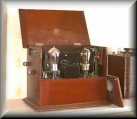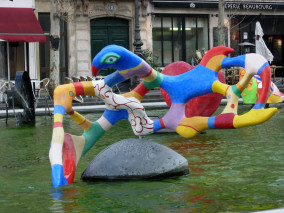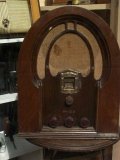TEACHER - INTRODUCTION - LESSON PLANS
(Now retied) I rely on my radio courses for information and advice here.
Please accept the limits of my experience, having worked in a Radio Studio (Studio + Director's Room)
- a full professional radio drama suite, and post-production on Adobe Audition software.
ON THIS PAGE - below

|
FILMIC APPROACH IN PRODUCTION AND POST-PRODUCTION I prefer the 'filmic' approach now - working mostly in post-production, and reducing the amount of SPOT EFFECTS work in Studio production. This puts the energy and creativity of the PRODUCTION PHASE (IN THE STUDIO WITH ACTORS) mostly into working with the actors. For this FILMIC SYSTEM, you need to have a large archive of digital sound effects - see SOUND BOX - production sound effects archive
But, all the same, students have to be trained in SPOT EFFECTS (such as 'opening the letter', 'tea cup and spoon and saucer', 'wine bottle and glass' in the Studio with the actors). I find that although this spots effects training is necessary, it can take up too much time. Getting spot effects right can crowd out the precious time for directing actors. Energy and time are diverted. The best control over effects is when you are working in post-production, at the computer with PRE-RECORDED EFFECTS. My best example of the subtlety and believability you can bring to dialogue in post-production is by getting PRESENCE into the scene: |
| See record 'umms' from all the characters to store |
| A special folder in SOUND BOX for 'character movement' - rustles and shifting and body 'creaks' and clothing (the body 'outside') |
| Inbreaths and outbreaths (male and female) (the body 'inside') |
| Lots of steps and shifting around (male and female - on all sorts of surfaces) |
| You set up TRAINING EXERCISES FOR THIS. Your students have got to hear this first in good radio drama dialogue, to hear this for themselves in the LIFEWORLD, and to work on this for themselves. Once again, radio drama is often the miniature work in detail. |
|
I prefer to go for results. I prefer to be in control as much as possible. This also depends on getting acquainted with the range of pre-recorded effects you have in SOUND BOX. That takes time for me as teacher, and takes time for my students. So part of my training is to acquaint the students with the most important and effective elements in SOUND BOX in the TRAINING - 'NURSERY SLOPES'. I have worked on a lot of production and post-production myself - hands-on. It's crucial that as a teacher, I have the working experience that I put my students through. In 2004, I worked for five months on a radio soap (serial drama) project in a London prison - Wandsworth Prison. I completed nearly all of the approx 40 episodes myself - the production and post-projection.
Here I go into some of the working detail of my radio course as a teacher. (This is not complaining! But just to give you some of the day-by-day working problems.) OBJECTIONS TO MY SOUND BOX SYSTEM NOT ENOUGH OF THE EFFECTS NEEDED THERE Admittedly, students point out to me that there are not enough of the exact sound effects that they need in SOUND BOX. The last example was 'computer typing'. But that is an effect that can easily be pre-recorded, as wild-track, before working with the actors, in any particular project. And curiously, on the same project, another student recorded 'computer typing' (in another scene), and got it wrong. He did not record a take of the scene 'dry' (without effects). So the only take he had to work with for his post-production was dialogue including the Spot 'computer typing' (which I thought too loud and which battled against the dialogue). NOT ALL THE FILES ARE USEFUL Another complaint from my students - not all the pre-recorded files there are useful, and some of them are not good enough quality. That is true! And I constantly resort and delete. And constantly update with new effects. Of course students have to go out and record new effects for themselves, and work in post-production treating effects and creating.
MAKING THE MOST OF ACTORS' TIME There is usually so little time with actors. Creative directing of actors has to come first PLUS the most efficient use of Studio time. Actors in student productions on my course are not professional and so have to be trained in. Admittedly actors like to work with spot effects themselves, and it often helps them to be more 'real'. I always require that actors are as physical as possible - reaching for objects, lifting, sitting and standing up, turning, moving etc. Anyone who has seen professional radio actors is surprised at how physical they are, and even if standing, a free arm can move a lot, even swinging around, and pumping up energy. Also gesturing and gesturing to scene partners.
See Perspective Key terms: close-up shot (CU)
OUTSIDE STUDIO PRODUCTION (OB) I train students in OUTSIDE STUDIO PRODUCTION from early on.
|
| You gain fresher acoustics, fresher acting, with more physicality, and more of a feeling of inhabiting the locations for the scenes. |
| Actors can make longer approaches to the microphone, so that 'moves off' (position no 5) really is at the edge of the sound picture. Ditto moving away from the microphone. Actors and run up to the microphone and away again. This suits all sorts of plot situations and types of plays (genres). |
| From the PRODUCTION (resources) aspect, this encourages more efficient production. One group of students work in the Studio with actors on some scenes, and the other group of students work OB at the same time. Actors (on the soap project) are being used very efficiently. |
PROBLEMS WITH OB:
| Weather - wind! Noisy objects - airplanes, people, machinery, traffic. |
| Depending on the time of year - can be cold. |
| Needs specific training and a bit more time allowed, as you are not under control of the conditions. |

I always work with short scenes
| Soap Project - scenes are short - about a page each at most. |
| For the students' FINAL PROJECT, I encourage excerpts rather than whole finished play. Total at most 12 minutes or (exceptionally) 16 minutes. Excerpts show the student's directing style and the solutions to all the problems of the piece. (Adaptation or own-scripted) |
| I ban adaptations of stage scripts. Stage play scenes have a different tempo, not suited to student productions, and to student actors. I am aware that this is directive, but it is a short cut to avoiding difficulties. I am emailed by students and teachers because of my web sites, and I welcome these emails. But it surprises me that first-off radio drama productions are planned from stage scripts. See my advice also in STUDENT - INTRODUCTION. |

See also Soap Project - INTRODUCTION

See EXPERIMENTAL radio drama pieces - first steps - structure - techniques you can use
See Why work on experimental pieces? there.
Working on experimental pieces creatively suited to student work.
It demands an increasing knowledge of sound in the Lifeworld, and of broadcast conventions of radio drama.
It can benefit students' PORTFOLIOS when seeking media jobs.
It refreshes radio drama production and radio commercials.
There is to much to learn from experimental films, and experimental live performance.

See the THEORY LESSON PLAN.


MY GREATEST DIFFICULTIES - or some of them (as a teacher)
| Opening class - getting the students to discover the conventions of listening to radio plays, the techniques. This requires special patience on my part, as I have worked with the detail of these techniques for so long. I have to go back to the beginning again, and appreciate that most of my students have not yet listened to radio plays aware of these conventions. They have learned the conventions of film and TV, but they are now beginning with radio drama. Each sound event of the first play on the course (see Lesson 1 in Radio Drama Theory Lesson Plan), has to be unpacked. |
| This needs patience. The students have to discover these techniques for themselves. I make regular parallels with the film soundtrack. It's also exciting to hear each class discover radio. |
| DIALECT: It is a ongoing demand to recognise geographical accents (dialects). We all recognise some. But for radio, we need to develop dialect skills as systematically as possible. I begin with www.accentbank.co.uk - this is a small actors' voice-over site, in the UK, with downloadable clips demonstrating some regional accents. This is a skill I have to work with myself continuously. Also, I encourage students to search for dialects when auditioning. |
|
MISMATCH BETWEEN RADIO PLAYS AND STUDENTS' TASTE? (I have written about this previously.There is a marvellous range in BBC radio drama. But the audiences are different from my average students.) 4.2 "Frankly, the few of us who are teachers of radio drama, have to face the mismatch - as opposed to our colleagues in film, television and performance studies - between the listener demographic of B.B.C. Radio 3 and Radio 4 plays, and the average age of our students." 4.3 "So, the bulk of radio drama is passing entertainment.
Students cannot fetishize plays. They have to listen to a range
of the broadcasting flow and they have to 'let go' of many of
these plays. " See Beck, Alan, 2000, 'Playing by ear: new
ways of teaching and researching radio drama', Studies in Theatre
and Performance online, December 2000, electronic publication,
|
|
I rely for my inspiration on the words of a French historian Jules Michelet (and admitting that this is a bit over the top): 'I have always made the effort only ever to teach what I have got to know about myself. I have found those things as they were in my own passions and experiences - new, enlivened, energised, as if under the first attraction of love'. (my translation) (In the French) "J'ai toujours eu l'attention de ne jamais enseigner que ce que je ne savais pas. J'avais trouvé ces choses comme elles étaient alors dans ma passion, nouvelles, animées, brûlantes, sous le premier attrait de l'amour". WHAT THIS MEANS FOR ME: I have always done a lot of production and post-production in projects myself. For example, I completed 40 episodes of a radio soap, improvised with Category A prisoners in a London prison. (I am not so sure about the 'love' thing that Michelet mentions - just that I have myself done much more labour than I have required of my students.) |

| Marking criteria |
| BBC Editorial Guidelines - links and excerpts |
|
|


